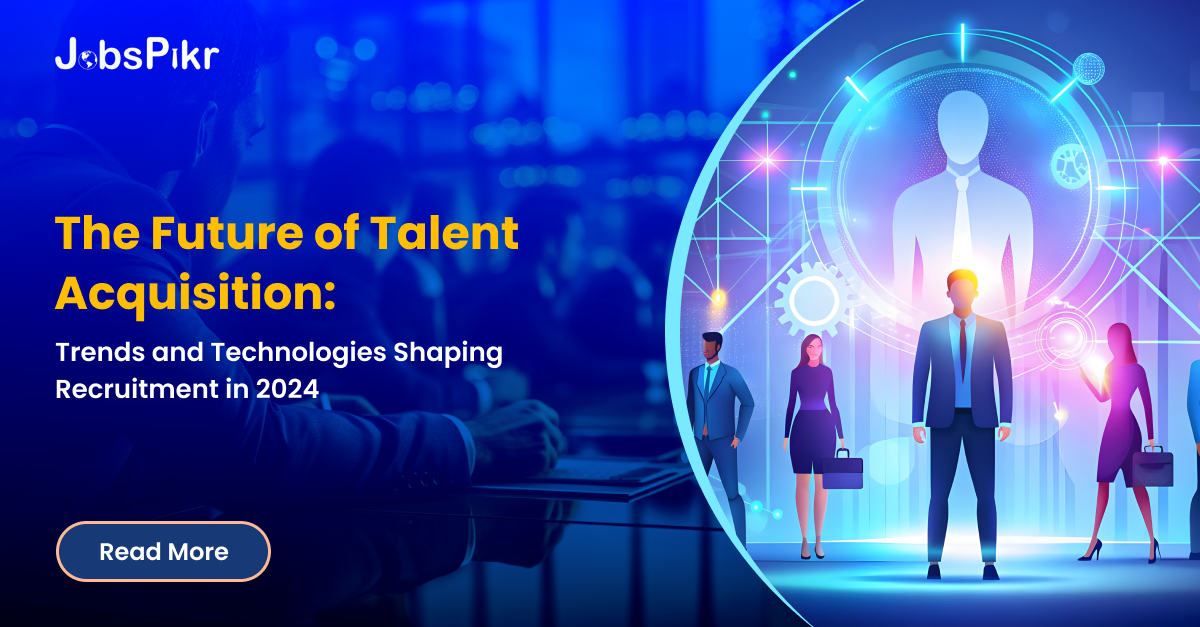What is Talent Acquisition?
Before diving into the future of talent acquisition, it is critical to define what talent acquisition entails. Talent acquisition is a strategic approach to identifying, attracting, and onboarding top talent to meet an organization’s needs.
Unlike traditional recruitment, which focuses on filling specific positions, talent acquisition emphasizes long-term human resource planning and finding appropriate candidates for positions that are crucial for growth and development.
This involves a continuous cycle of workforce planning, employer branding, candidate management, and analytics. The ultimate goal is to build a sustainable pipeline of high-quality candidates to drive future business success.
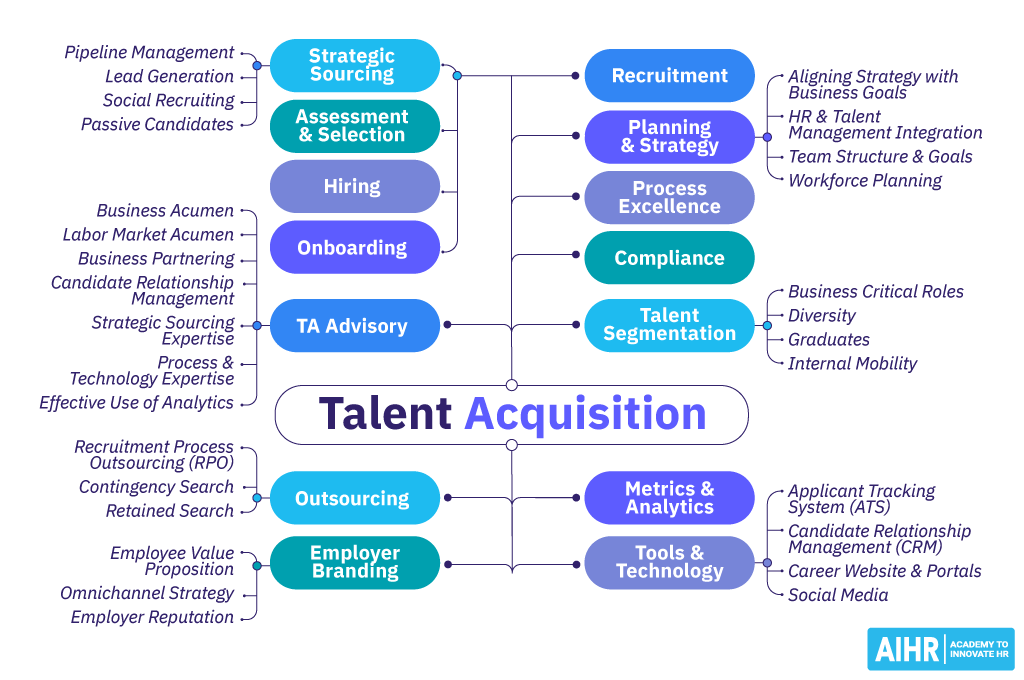
Image Source: AIHR
Talent Acquisition vs Recruitment
Talent acquisition and recruitment are often used interchangeably, but they represent different approaches to staffing. Recruitment is a reactive process that involves filling open positions quickly, focusing on the immediate needs of the organization. It’s typically a short-term solution, aiming to find candidates who meet specific job requirements.
In contrast, talent acquisition is a proactive, strategic approach that goes beyond simply filling vacancies. It involves long-term planning to attract and nurture top talent that aligns with the company’s broader goals. Talent acquisition encompasses various elements like employer branding, candidate relationship management, and workforce planning. The objective is to build a continuous talent pipeline that can support the organization’s future growth and adaptability.
Understanding the distinction between these two concepts is crucial for organizations looking to align their hiring strategies with long-term business objectives.
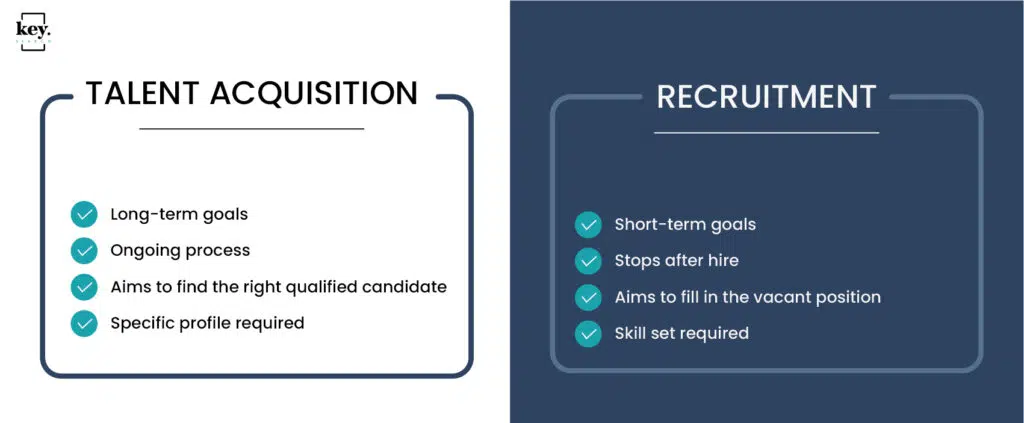
Image Source: Medium
What is The Future of Talent Acquisition?
The future of talent acquisition lies in the integration of advanced technologies and innovative strategies to attract top talent. Artificial intelligence (AI) and machine learning will transform recruitment processes through predictive analytics and personalized candidate experiences.
Digital platforms will enable global talent sourcing, expanding the talent pool beyond traditional geographical boundaries. Companies will increasingly focus on employer branding, using social media and virtual reality (VR) to create immersive job previews. Additionally, diversity, equity, and inclusion (DEI) initiatives will be paramount, ensuring equitable opportunities for underrepresented groups and fostering a more inclusive workplace environment overall.
Artificial Intelligence and Machine Learning in Hiring
Artificial Intelligence (AI) and Machine Learning (ML) are transforming the hiring landscape by enhancing efficiency and decision-making. AI-driven tools analyze vast amounts of data to identify patterns and predict candidate success, leading to more informed hiring decisions.
ML algorithms can automate repetitive tasks, such as resume screening and interview scheduling, saving recruiters significant time. Additionally, AI can help mitigate unconscious bias by focusing on data-driven qualifications over any subjective criteria.
Organizations leveraging these technologies benefit from a streamlined hiring process and improved talent acquisition strategies that align closely with actual performance metrics.
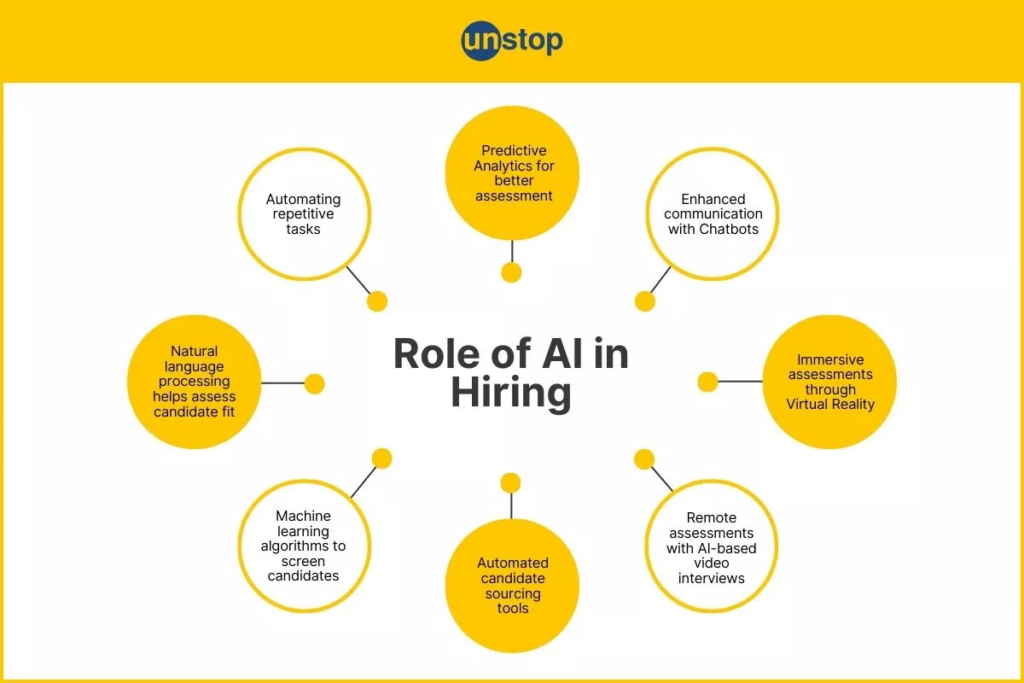
Image Source: Unstop
The Role of Automation in Streamlining Processes
Automation significantly enhances efficiency in talent acquisition by reducing repetitive tasks and minimizing human error. Talent acquisition platforms can handle the bulk of resume screening, scheduling interviews, and managing candidate communication. This allows human recruiters to focus on strategic aspects like engaging with candidates and building relationships. Key benefits include:
- Reduced Time-to-Hire: Faster processing of applications.
- Improved Candidate Experience: Prompt communication.
- Enhanced Decision-Making: Data-driven insights and analytics.
By integrating automation, organizations can scale their hiring operations efficiently, ensuring they remain competitive in the fast-paced job market.

Image Source: SHRM
Impact of Remote Work on Talent Acquisition
Remote work has significantly altered talent acquisition strategies, enabling companies to access a broader talent pool unrestricted by geographic limitations. This shift encourages diversity and inclusion, as organizations can hire individuals from various cultural, ethnic, and socio-economic backgrounds. Moreover, companies are no longer confined to local talent shortages, which can mitigate skill gaps and enhance overall workforce expertise.
However, recruiters must adapt to new challenges, such as assessing candidates’ ability to work independently and maintain productivity remotely. Embracing digital tools for virtual interviews, assessments, and onboarding is crucial for successfully navigating this paradigm shift.

Image Source: DistantJob
Using Social Media & Digital Platforms for Recruitment
Harnessing the power of social media and digital platforms has emerged as an indispensable strategy in modern talent acquisition. Recruiters leverage platforms like LinkedIn, Twitter, and Glassdoor to identify and engage potential candidates. Utilizing targeted ads, they can reach a diverse and global talent pool.
Tools such as AI-driven chatbots on career sites streamline the application process and improve candidate experience. By integrating analytics, recruiters can track engagement metrics and refine their strategies. Platforms with professional networks also provide deeper insights into candidate profiles, enhancing the recruitment process significantly.
The Rise of Gig Economy and Freelance Talent
The gig economy has seen exponential growth, transforming traditional workplaces and reshaping talent acquisition strategies. Companies are increasingly leveraging freelance professionals to meet dynamic business needs, driven by the demand for specialized skills and cost-efficiency. Platforms like Upwork, Fiverr, and Toptal facilitate this trend, offering businesses access to a global pool of versatile talents. Benefits include:
- Flexibility: Adapt workforce size based on project demands.
- Expertise: Access niche skills not available in-house.
- Cost-Efficiency: Reduce long-term employment expenses.
This shift calls for innovative recruitment tactics and robust freelance management tools to ensure seamless collaboration and quality outcomes.
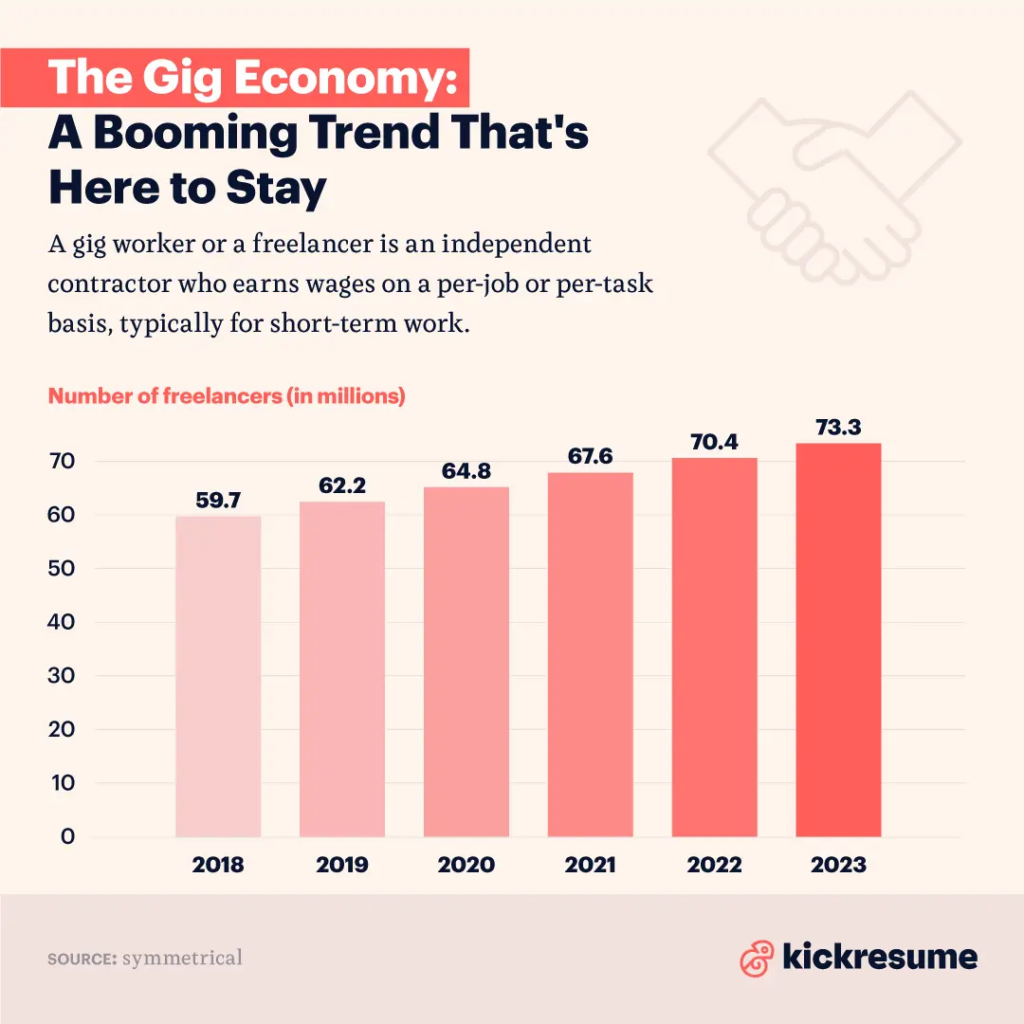
Image Source: KickResume
Diversity and Inclusion as Core Hiring Strategies
In today’s dynamic workforce, diversity and inclusion are increasingly becoming central to talent acquisition strategies. Companies are leveraging advanced tools and practices to build teams that reflect a wide range of experiences, perspectives, and backgrounds.
These strategies involve:
- Implementing unbiased recruitment technologies.
- Conducting inclusive hiring training for recruiters.
- Adopting diverse interview panels.
- Creating supportive workplace cultures for all employees.
Building such diverse teams is not merely a moral imperative but also a business one, as it fosters innovation and drives better decision-making. Inclusive hiring processes ensure a wider talent pool and enhance the company’s adaptability in a global market.
Future Skills and Competencies in Demand
The evolving job market places high demand on a range of future skills and competencies pivotal for success. Key areas include digital literacy, data analytics, and artificial intelligence, as automation and advanced technologies become more integrated. Critical soft skills such as emotional intelligence, adaptability, and creative problem-solving are equally essential.
Businesses seek professionals proficient in cross-functional collaboration and strategic thinking. Proficiency in emerging technologies like blockchain and cybersecurity is increasingly important. Continuous learning and adaptability will remain crucial as these trends accelerate, influencing the competencies required for tomorrow’s workforce.

Image Source: World Economic Forum
Sustainable and Ethical Recruitment Practices
Implementing sustainable and ethical recruitment practices has become crucial for organizations aiming to attract top talent while maintaining corporate responsibility. Companies are increasingly focusing on diversity and inclusion, ensuring fair hiring processes that avoid biases. There’s a growing trend towards employing AI tools to anonymize resumes, preventing discrimination based on gender, race, or age.
Additionally, businesses are adopting green hiring practices that involve virtual interviews to minimize carbon footprints. Internally, fostering environments where employees see growth ensures retention. External certification, such as B Corp, may validate these efforts, reinforcing the commitment to ethically responsible recruitment methodologies.
Conclusion
As organizations strive to adapt to emerging talent acquisition trends and technologies, partnering with a reliable job data provider becomes crucial. JobsPikr offers comprehensive talent intelligence solutions to support and enhance recruitment strategies.With access to real-time job market data, companies can make informed decisions, streamline their hiring process, and stay ahead in the competitive landscape. By leveraging JobsPikr’s advanced analytics and customized insights, businesses can effectively forecast talent needs, identify skill gaps, and optimize their workforce planning. Sign up now.
